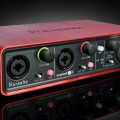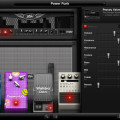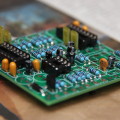With the latest Android OS version, 4.1 or popularly Jelly Bean, there is finally support for low-latency audio. Latency is the delay between the initiation of an audio event, like a sound being played by an app or a signal being fed into the phone, and the actual result – such as outputting the sound in the speaker or recording the input signal. Previously the access to audio devices in Android phones has been to indirect causing latency of something like 100 ms or worse – and that’s just output latency.
 For a guitar amp simulator you have two latencies to deal with, both input and output, since you’re playing and monitoring through the device. At 100 ms it is impossible to play, the lag is unbearable and it feels like those cell phone calls when you constantly hear an echo of yourself. You’re completely thrown off and can’t concentrate. Latency below 10 ms on the other hand is not noticeable by most people. The GuitarJack interface for iOS which I reviewed previously, has a total latency of about 28 ms if you sum up the whole chain – input -> processing -> output. I’m pretty sure the competitors like Apogee Jam end up at about the same numbers. For me, latency like that has never been a problem.
For a guitar amp simulator you have two latencies to deal with, both input and output, since you’re playing and monitoring through the device. At 100 ms it is impossible to play, the lag is unbearable and it feels like those cell phone calls when you constantly hear an echo of yourself. You’re completely thrown off and can’t concentrate. Latency below 10 ms on the other hand is not noticeable by most people. The GuitarJack interface for iOS which I reviewed previously, has a total latency of about 28 ms if you sum up the whole chain – input -> processing -> output. I’m pretty sure the competitors like Apogee Jam end up at about the same numbers. For me, latency like that has never been a problem.
According to the blog Create Digital Music the target latency for Android 4.1 is below 10 ms (output latency I assume). If this can be achieved over different hardware, the stage is finally set for amp sims like AmpKit, Amplitube, JamUp and others to enter the Android arena. Considering how many competing products there are for iOS, there should be a strong built-up need to port these to Android – from both consumers and developers.
I really hope Jelly Bean delivers – the world needs more guitar players being able to practice wherever and whenever!
If you’re an Android buff and come across news in this field, please add it in the comments!




